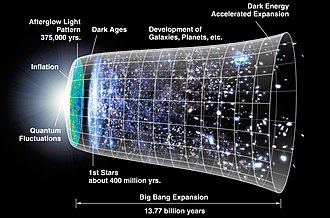CorporateNature No 138
In physics, the concepts of space and time are fused together into a single four-dimensional spacetime mathematical model that describes our universe. Einstein’s theory of special relativity has made it impossible to look at space without considering time, and vice-versa.
The idea that space and time are different sides of the same coin can also be useful on a more everyday level. Consider the following:
1. THE CONDENSED SPACE OF THE BIG BANG VS. THE CONDENSED TIME OF MODERN LIFE
According to the big bang theory, all of the matter in our universe started its expansion from one single point. For hundreds of thousands of years, matter was so dense and the universe so hot that only subatomic particles existed (and for short periods of time). What is more, even if we were to go back and observe this period in the history of our universe, we wouldn’t be able to see anything.
As astrophysicist Neil deGrasse Tyson explains “in this early epoch, photons didn’t travel far before encountering an electron. Back then, if your mission had been to see across the universe, you couldn’t. Any photon you detected had careened off an electron right in front of your nose, nano- and picoseconds earlier.”
Similarly, 21st-century life in a developed society is typically characterised by an overabundance of condensed time. We easily get swept away by the overwhelming current of day-to-day responsibilities and worries. Everything has to happen now (even yesterday, if possible). When we are immersed in a constant state of information overload, it is easy to lose sight of what really matters in life. This constant stream of information we receive is just like the electrons knocking photons in our eyes.
2. THE EXPANDING UNIVERSE VS. THE EXPANSION OF TIME DURING THE PANDEMIC
As the universe expanded and cooled down, matter eventually became diluted enough to allow for atoms and different elements to form. This, in turn, led to the emergence of stars, galaxies, planets and, ultimately, living beings. The ideal environment for this creation process was one of less density.
The events of 2020 have forced a similar sort of expansion of our time and dilution of our daily tasks. The state of pandemic lockdown that a large part of the developed world was forced into has given us a chance to slow down. In fact, time during lockdown seems to have almost stopped compared with the pace just a few months earlier.
Living this new reality, we have come to recognise that certain lifestyle choices from the past don’t seem that appealing anymore. Suddenly, all those work emails and conferences have lost their perceived previous importance. Maybe some of us have been put off by the clutter both in our homes and in our previously hectic daily schedules. Maybe others have decided to take a new career path. But hopefully, a lot of us have learned to place greater importance on our relationships with loved ones, rather than on material possessions and social status.
This period of expanded time can be viewed as the catalyst to new opportunities. It has certainly given us plenty of time to think and plan for the future.
***
According to some theorists, the universe will expand to a certain point and then start condensing back to that point before the big bang. This is one of the great mysteries that astrophysicists face today.
What is certain, however, is that as the world returns to normalcy after the pandemic, our time will once again begin condensing into the way it was before. It is ultimately up to us to decide how we want to live once that happens.
Hopefully, we are not too quick to forget the lessons we have learned over the past few months.

Timeline of the expansion of space (image source: Wikipedia)